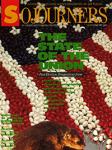We do it every year. For a decade now, Sojourners Community has gone on retreat together over the Thanksgiving weekend. After the traditional Thursday holiday dinner at our neighborhood center (this year about 400 people were fed), we all head out of the city on Friday morning and don't come back until late Sunday afternoon.
Every year the annual retreat is a long-anticipated event. The kids especially enjoy it, and there is no other occasion during the year when we have so much uninterrupted leisure time just to spend with one another.
This year, we were led by Gordon Cosby, the pastor of the ecumenical Church of the Saviour in Washington, D.C., and a good friend of the community. With wisdom and grace, Gordon led us through many of the pressures and temptations of community into silence to search, each of us, for the "still point" where God breaks through.
For most of us, the silence was as unaccustomed as the quiet but arresting beauty of the Maryland fields and hills. The deprivations of beauty, space, and solitude that come as a consequence of a call to the inner city take more of a toll on us than we realize. Long periods of silent wandering over the pastoral landscape were as refreshing as the cool, fall air itself.
We have come back to this particular place--a former plantation turned into a school and eventually converted to an Episcopal retreat center--for several years now. When I started off walking on Saturday morning, through the farm fields and out toward the old barn, I knew where I would probably end up--the place where I always return.
It's a slave cemetery from the old plantation days. There is no marker or memorial. Nor are there any gravestones. This was a common burial ground bordered by a waist-high stone wall which is now crumbling in many places. A grove of trees, now barren in the late fall, surrounds the sacred resting place.
Inside the rectangular wall sits an old bench, and it was there that I came to rest. I just needed to sit for a while with these children of God whose sorrow and pain brought them closer to their Lord than most of us ever get. They waited all their lives for deliverance and it never came. But in their waiting and hoping, they discovered a presence and a power never understood by their oppressors.
HOW IS IT THAT out of the experience of such violent suffering came the most powerful spirituality this country has ever produced? The spirituals, the gospel music, the preaching, the prayer, and the social transformation that flowed from that mighty river of human pain have shown the redemptive truth of the cross more clearly than almost 400 years of white Christianity in North America.
I needed to rest here again among the slaves--to listen with them, talk with them, and pray with them. These past few years, theirs is the only faith that touches the depths of my own heart and soul. Nothing else reaches down far enough.
The slaves knew utter powerlessness, and out of that they found the power of God. For me, that has become the deepest struggle these last few years. I've discovered that the hardest thing about the cross is not the suffering but the powerlessness. It's been far easier to embrace the suffering than to willingly accept the powerlessness.
After a while we can deal with sacrifice and even suffering, but it's the abject powerlessness that is the great scandal of the cross of Christ. Yet it was the cross, the final moment of Jesus' downward, descending journey, that released the power of the Resurrection, says Gordon Cosby.
It's the cross that breaks our hearts--the total kenosis--that complete pouring out that unlocks the mystery of God's resurrection power. It's never achievement and success--and it wasn't for Jesus, either, Gordon frequently reminds me. It's always the giving of ourselves in faith. It is in that powerlessness where the real power lies.
It is such a fundamental change that the gospel calls us to. Nothing less than a shift of our whole modus operandi is required. Our very foundations are uprooted so that we might be planted in deeper ground. If we don't choose such transformation, it may be forced upon us by a God who will not be through with us until we learn what the slaves had to learn.
But what a transformation that is necessary. Our own power proves inadequate, so much so that all that is left to us is to rely on God's power.
We are shaken from our natural talents to accept our spiritual gifts. Our slow movement is from achievement to self-giving, from filling up to emptying out, from being the center to becoming a channel. Only then will we finally relax and act out of gratitude more than obligation, grace instead of law, hope rather than expectation.
But it's more than relaxing; it's letting go. Our drivenness must give way to peacefulness, our anxiety to joy. So concerned with effectiveness, we must learn to be content with faith. Strategy grows into trust, success into obedience, planning into prayer.
Our accomplishments become measured by their faithfulness. And finally our swords are turned into crosses, our violence into nonviolence. The consequence of our former path is dissipation, the end of our new course is resurrection.
What the slaves have left us is the fruit of redemptive suffering and the ultimate power of powerlessness. Their legacy has outlasted every other memory and achievement. Through their faith ours may still be saved.
On a quiet, fall day in the Maryland countryside, their voice can still be heard, their presence still felt. Their wisdom can still teach; their lives can still heal ours.
Jim Wallis is editor-in-chief of Sojourners.

Got something to say about what you're reading? We value your feedback!
